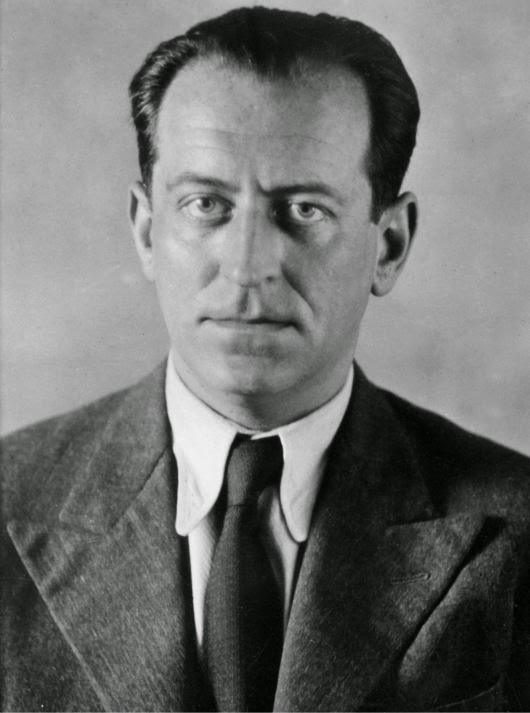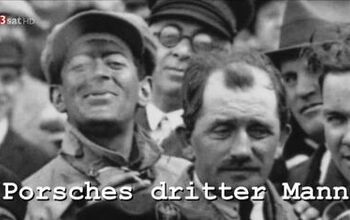Porsche's Forgotten Man, Adolf Rosenberger: Dr. Porsche's Jewish Partner, Part Two

In Part One, we looked at Adolf Rosenberger’s success as a businessman and racer, his seminal role in the creation of Auto Union, and his vital role in the founding of Dr. Ferdinand Porsche’s design agency in 1931. We also reviewed how increased persecution of Jews in Germany after Adolf Hitler took power in 1933 led to Rosenberger’s 1935 arrest by the Gestapo, his subsequent release (no thanks to the Porsches), and his leaving Germany for good in 1935.
In Part Two, we’ll look at Rosenberger’s life after Porsche.
In 1936, Rosenberger first visited the United States and eventually emigrated there, changing his name to Alan Arthur Robert. He tried his luck looking for work in the auto industry in Detroit, but moved to California after failing to find opportunity in the Motor City.
Gestapo photograph of Adolf Rosenberger upon his incarceration in a Nazi concentration camp, 1935
By then his relationship with the Porsche company had deteriorated. In a 1966 interview with the German ZDF network, Rosenberger/Robert explained his situation in the mid-1930s:
Porsche still owed me money, and continued to pay me since I still worked for the company [in Paris]. They wired me installments of foreign currency, which absolutely helped me from the start.
Then after my first visit to America, I received a letter saying that the company was no longer capable of upholding my contract, on instruction from the authorities, and that they were also no longer able to correspond with me. That was basically the termination of our relations.
By then the Porsches saw Rosenberger as a cost that wasn’t generating revenue. After the war, though, the Porsche and Piëch families contended that the Nazi authorities had pressured them to disassociate from their Jewish employees.
In 1936, the Nazis had enacted the Nuremberg Laws that disenfranchised German Jews and stripped them of their legal rights. Not only did Adolf Rosenberger not have any recourse in German courts, his movie theater, house and real estate in Pforzheim were “aryanized” by the Nazis.
Martin Walter, director of the Rastatt district archives in Germany, believes that the Porsches could have done more to help Rosenberger.
I think that the Porsche family did far too little to support Rosenberger and could have done more, and must do more. And if then you know that his friend Veyder-Malberg helped him and not Dr. Porsche himself, and that the Porsche family did not see him off at the train station when he left for Paris … that is sad. They really let a co-founder of the company fall like a raw egg.
…
Without Rosenberger, there would be no Porsche company and yet, they dropped [him] like a hot potato.
As mentioned above, after the end of hostilities, in 1948 Rosenberger went back to Germany to seek redress.
In his 1976 autobiography, “ We At Porsche,” Ferry Porsche provided his version of the events. The younger Porsche said Rosenberger demanded 200,000 deutschmarks, with half paid in advance, and the full sum tax deductible, since it represented compensation. Porsche found that unacceptable as they would be liable for the taxes but they agreed on a compromise of several thousand marks and a free new Volkswagen.
When that was published, Adolf Rosenberger had been dead for almost a decade so there was nobody to contradict the Porsche family’s accounts, but the Ludwigsburg state archives do give the official account of the restitution proceedings in late 1949.
The British occupation forces had restarted the Volkswagen works in Wolfsburg in 1946 and, by 1949, VW was well on its way to being a success, with the British turning the company over to the government of Lower Saxony.
In 1946, the Porsches and Piëches were impoverished. In California, Rosenberger received letters from both Dr. Porsche and his son-in-law Anton Piëch begging their former partner to send them American coffee, chocolate and thousands of dollars. Rosenberger sent them care packages.
Though Ferdinand Porsche and Anton Piëch spent 22 months in French custody for their collaboration with the Nazis, their financial fortunes were improving by 1949.
The Porsche company continued to do development work on the VW Type I (a.k.a. Beetle) under a contract that went from 40,000 marks a month to 480,000. Plus, VW was paying Porsche a licensing fee of 0.1 percent of the list price of every vehicle they made (said by some to discourage Dr. Porsche from developing his own small car). That royalty worked out to about 5 DM a car, about $1.25. VW made over 46,000 Beetles in 1949, with production nearly doubling the following year.
The Porsche/Piëch clan held the exclusive distribution rights of Volkswagen products in Austria. Porsche also introduced its first self-branded car — the relatively expensive Porsche 356.
The trustee of the Allied occupation forces assessed the 1949 value of Porsche’s assets at 1,178,000 DM.
Archivist Martin Walter describes the Porsche family’s recalcitrance at the restitution proceedings:
Rosenberger puts it quite dramatically, he believes that he had been forced by the Nazi government to withdraw from the jointly owned company. This is clearly and objectively the truth. The worst is of course that Porsche initially recognized no restitution claims so Rosenberger had to enforce his rights, which resulted in the Porsche company coming under the supervision of the Allied Commission on Reparations.
Pending resolution of Rosenberger’s claim that he was still owed the equivalent of 180,000 reichsmarks, a trustee appointed by the Allied Commission temporarily took control of the Porsche company away from the family.
While money was undoubtedly an issue, Rosenberger’s great-nephew Harmut Wagner says that his uncle wanted recognition for his role in automotive history.
I know that in our family Uncle Al — Mr. Rosenberger — repeatedly said that the worst thing for him was not the economic damage, but the hurt that he had, the feeling. You do not believe him; the stories, you do not believe him. Of course, to not be given credit or recognized was to have Porsche lie about its own biography, because the public does not recognize … simply to endure injustice in the form because they do not want his story to be heard, so that has deeply affected him. And I think he has then eventually resigned to it.
Though they wanted to get control of their company back, it appears that the Porsche family was also trying to run out the clock on Rosenberger. Family lawyers negotiated for over a year, repeatedly postponing hearing dates, making it difficult for Rosenberger who lived in California. Porsche lawyers had access to the separate restitution proceedings for Rosenberger’s Pforzheim assets, which showed that he had been in poor health for some years, with heart problems and a stroke.
Alan and Anne Roberts, the former Adolf Rosenberger and Anne Metzger in California sometime in the 1950s.
Rosenberger was not a wealthy man. There’s no permanent record of the company he started in Los Angeles. He was married to the former Anne Metzger, also from Pforzheim, after she immigrated to the U.S. in 1939. The two met when she worked as a secretary in the Porsche design agency back in Stuttgart. They had no children.
The lawsuit dragged on but finally, in late September of 1950, the Restitution Chamber of Landgericht Stuttgart approved an agreement between the two parties:
Adolf Rosenberger receives from Porsche DM 50,000 and a car, optional immediately a VW in luxury version for the price of DM 5.450.- or later than to July 1, 1951 are a Porsche sports car for the price of DM 9.850.-. Thus all claims Rosenberg’s opposite the company Porsche paid.
Since those were the retail prices of those cars, I assume the figures were cited for valuation purposes, not that Rosenberger had to pay for his car. As mentioned above, Ferry Porsche said in his autobiography that Rosenberger got a free Volkswagen.
As an aside, it’s surprising that Rosenberger, a former racer, picked the Beetle sedan and not the 356 sports car. Of course, the early 356 cars were based on the Beetle and not much faster. Maybe it was a practical consideration. By 1950, VWs were being imported into the United States and it was probably easier to get parts and service on a VW than on a Porsche.
With that the case was done. Rosenberger used the money to set up a shop in Los Angeles called Coach Craft. It appears to have been some sort of coachbuilding or body shop.
Rosenberger/Roberts at his Coach Craft company in Los Angeles.
While 50,000 DM was not a small amount of money in 1950, remember that it was to compensate Rosenberger for his 10-percent share of the company and for the value of his 80,000 RM loan. In recent years, the term “the most profitable car company in the world” has been applied to Porsche and the Porsche/Piëch clan has used its Porsche holdings to take and keep control of the much larger multi-billion dollar Volkswagen Group. What would 10 percent of Porsche and VW be worth today? I don’t have to guess that it’s a bit more than 50,000 DM.
Money is just money, though. Can you put a value on a person’s legacy?
Today, though the Porsche museum does have a small reference to Adolf Rosenberger accessible on a computer screen, and while the company archivist participated in a documentary about Rosenberger, for the most part the company is silent on his important role in establishing the company.
Martin Walter says:
The historian in me always tries to be moderate and evaluate things, but I think the fact that Porsche no longer remembers Rosenberger — Porsche does not commemorate him and evokes no memories of him — is very, very shameful, especially for a large German company such as Porsche, which has a worldwide reputation.
Without Adolf Rosenberger, the Porsche company would not have existed. He is one of three founders besides Anton Piëch and Ferdinand Porsche. You know Porsche and Piëch still have influence on both, on Volkswagen and Porsche, and Rosenberger is indeed a forgotten man — wrongly. Here in Germany is negated to the role of German Jew Rosenberger indeed.
Adolf Rosenberger in 1966.
Adolf Rosenberger died at the age of 67 in late 1967 in his adopted city of Los Angeles. His ashes and those of his wife were buried in a Jewish cemetery in New York.
I’ve personally known about Rosenberger for years but until recently, though his role in the Porsche company’s founding was documented, only the briefest strokes of the story were at all well known.
In 2012, however, German director Eberhard Reuss completed a documentary about Adolf Rosenberger for the SWR2 television network, “Die Akte Rosenberger: Porsches dritter Mann” (The Rosenberger File: Porsche’s Third Man). I was able to find a script for an earlier edit of Reuss’ film. Between watching the documentary, what I knew about Rosenberger and German automotive history, and Google’s translation of the script, I was able to put this story together.
Special thanks go out to Jennifer Archibald for translating many of the quotes.
Unfortunately, the code isn’t available to embed a video of the half hour documentary, but even if you don’t speak German, I encourage you to watch it here, if only for the historical footage.
Rosenberger’s nephew Wagner is a producer in Hollywood, and the story certainly has drama, so we might eventually see a theatrical or made-for-TV movie about the man without whom there might not have been a Porsche (or Volkswagen) company or cars today. It wouldn’t necessarily have a happy ending (though thankfully Rosenberger survived the Nazis, unlike most of European Jews), but it would go a long way towards restoring Adolf Rosenberger to his rightful role in Porsche and automotive history.
Ronnie Schreiber edits Cars In Depth, a realistic perspective on cars & car culture and the original 3D car site.

Ronnie Schreiber edits Cars In Depth, the original 3D car site.
More by Ronnie Schreiber
Latest Car Reviews
Read moreLatest Product Reviews
Read moreRecent Comments
- SCE to AUX They're spending billions on this venture, so I hope so.Investing during a lull in the EV market seems like a smart move - "buy low, sell high" and all that.Key for Honda will be achieving high efficiency in its EVs, something not everybody can do.
- ChristianWimmer It might be overpriced for most, but probably not for the affluent city-dwellers who these are targeted at - we have tons of them in Munich where I live so I “get it”. I just think these look so terribly cheap and weird from a design POV.
- NotMyCircusNotMyMonkeys so many people here fellating musks fat sack, or hodling the baggies for TSLA. which are you?
- Kwik_Shift_Pro4X Canadians are able to win?
- Doc423 More over-priced, unreliable garbage from Mini Cooper/BMW.






































Comments
Join the conversation
Thank you for the article. I remember when Mercedes was doing it's "history" of Mercedes ad campaign and a few years were missing. What many readers might find darkly amusing is that many of the facts we know abut the final solution, and the Nazi regime in general, come from business records. For example the railways were constantly complaining to the government that they weren't properly compensated for the amount of cargo they were transporting. This cargo was humans going to the death camps, and the records by the railways were very detailed as they were payed by the head. Another was the bidding for the gas chambers. Various companies submitted their designs and details about materials to be used, added efficiencies and cost benefit analysis. These records were on file. We can get lost in the aggregate horror and forget that these were people interested in making money and going about their daily lives, and the real horror can be revealed in the mundane negotiations towards this end. That's one reason why articles like this are important.
Thank you for posting this. I believe organizations have a sort of cultural DNA which is set very early on and persists for decades, if not forever. This story of double dealing and actively hiding the truth at the very beginning of the VW-Porsche empire casts a long shadow; which leads directly to the diesel scandal of recent times. Balzac: "The secret of a great success for which you are at a loss to account is a crime that has never been found out, because it was properly executed."